Subscribe: Apple Podcast | Email | Spotify | Stitcher
Looking for low FODMAP breakfast recipes for school-aged children and teenagers? Then look no further. Here are 10 delicious IBS breakfast recipes that the whole family can enjoy.
Low Fodmap Breakfast
Below are our recommendations for the best IBS breakfast recipes for children with IBS.
The recipes only include low-FODMAP foods or high fodmap foods in the right quantities for an IBS-friendly breakfast.
Scroll down to view the full details of each individual low fodmap breakfast recipe.
- Delicious Strawberry Smoothie
- Sweet or savoury toast
- Wonderful yoghurt bowl
- Breakfast cereals
- Overnight creamy oats
- Sunday Oat and Banana pancakes
- Chocolate Waffles
- Peanut Butter Muffins
- Colourful Acai Bowl
- Kiwi smoothie
Would you like a PDF version of this blog delivered directly to your inbox? Pop your details below.
What is a low FODMAP breakfast?
If your child has been diagnosed with irritable bowel syndrome (IBS), your doctor may recommend that your child try the low FODMAP diet for approximately four weeks.
Unlike exclusion diets for children with food allergies, the low FODMAP diet should only be trialled for a short period of time to identify which FODMAPs cause bloating, constipation or diarrhoea for your child.
This list of low FODMAP breakfast ideas is perfect if your child is following my IBS Kids programme and are starting the elimination phase of the programme.
Can children have IBS?
In the United Kingdom, about 17% of the total adult population suffers from irritable bowel syndrome (IBS).
Usually, symptoms start between the ages of 20 to 30 years but children and teenagers can also be affected.
The prevalence of IBS in children is between 10% to 15% so it’s not uncommon.
The causes of irritable bowel symptoms are still not fully understood. Researchers suggest that it could be linked to hereditary, environmental factors, stress, hypersensitivity, inflammation, allergy, infection or a combination of different factors.
Research suggests that if a family member has been diagnosed with IBS then children are two to three times more likely to develop IBS symptoms too.
IBS in children: what are the symptoms for a diagnosis?
Your GP and paediatric dietitian specialising in IBS can help with a diagnosis. Although IBS is relatively common, there are more children and adults suffering without a diagnosis than those who have been diagnosed.
Here’s what your doctor will be looking for.
Recurrent abdominal pain on average for one day a week in the last 3 months plus two or more of the following:
- evidence of constipation for more than 25% of stools (separate hard lumps or lumpy and sausage-like)
- more than 25% of bowel movements suggest loose stools or diarrhoea (mushy consistency or liquid stools with no solid pieces)
- or mixed bowel habits described above
What is the best food for your child if they suffer from IBS?
If your child is diagnosed with IBS, it can be managed by modifying your child’s diet and lifestyle.
One treatment option for managing irritable bowel syndrome in children is the low FODMAPs diet.
A popular misconception about this diet is that many parents assume that you need to avoid your trigger foods for life.
However, unlike children following a strict diet for known food allergies, in the low FODMAP diet, children are still able to enjoy small amounts of FODMAPs.
Working with a paediatric dietitian specialising in IBS will help you identify your child’s trigger foods so that you know exactly how much of each FODMAPs food to give without triggering bloating, constipation or diarrhoea.
The best foods to give children diagnosed with IBS are therefore foods that you know they tolerate well.
My IBS Kids Programme will help you identify your child’s trigger foods.
Which foods can you eat on a low FODMAP diet?
On the low FODMAP diet, you can expect your child to be able to eat the following:
- a range of fruit and vegetables
- some types of nuts, beans and lentils
- meat, chicken, fish and eggs
- lactose-free milk and other low-lactose dairy foods.
Any of the above ingredients can be used to design your very own low fodmap breakfast for kids and teenagers.
Is it good to eat berries every day at breakfast?
Yes, you can! And so can the kids. Berries are delicious and highly nutritious low fodmap food.
Berries are a source of the following nutrients which are also great for beautiful hair and skin:
- antioxidants
- vitamin C
- fibre
- folate
A word of caution. Raspberries do contain fructans which is a type of FODMAP. In small quantities, it is a relatively low fodmap food.
With its boastful nutrition profile, it makes a perfect low fodmap snack. Despite this, do avoid giving large portions to young children as the level of fructans can stack up.
Not all children with IBS will have a problem tolerating fructans.
This is precisely why when designing an IBS breakfast menu, it’s important to understand and be aware of your child’s trigger foods.
Is it easy to put together a low fodmap breakfast?
Low fodmap breakfasts are easy to implement as it works by replacing some of the foods high in FODMAPs with lower FODMAP choices.
Breakfast is one of the most important meals of the day. It fuels your children with energy for school or university.
It is also the first meal of the day so the consequences of eating irritable or inflammatory foods at breakfast can lead to an increase in symptoms during the day.
So help your child or teenager start their day with low fodmap foods.
It will help reduce the IBS-related symptoms that they usually experience after a ‘normal’ breakfast.
We think you’ll love our ten delicious breakfast ideas below.
Our selection of IBS Breakfast friendly recipes for Kids
We hope that you enjoy the curated list of low FODMAP breakfast ideas for children and teenagers below.
All of the recipes below are IBS-friendly and suitable to follow on a low fodmap diet.
Low FODMAP Breakfast recipes and IBS friendly Recipes for busy school days
Delicious Strawberry smoothie
Recipe inspired by Thinky Bites
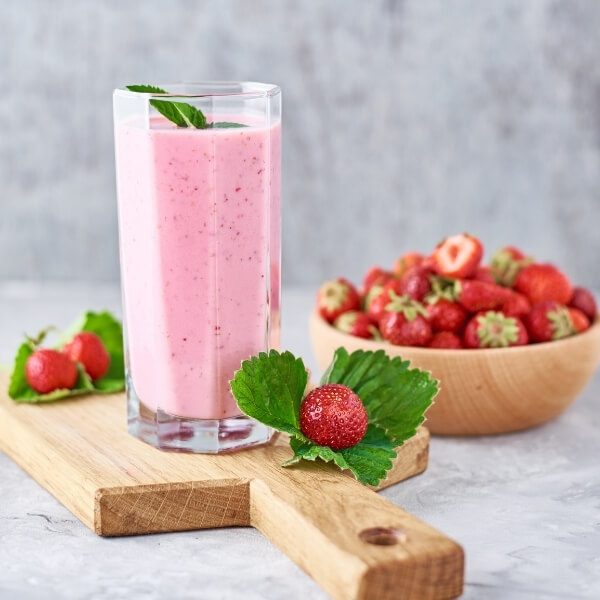
Ingredients
130ml lactose-free milk
10 strawberries plus 2 kiwis, 1 banana or 20 blueberries
1 teaspoon of peanut or almond butter
1/4 teaspoon of chia seeds (optional)
Directions
Blend all ingredients together in a blender. This recipe is great as it also provides 1 portion of fruit with a serving of plant protein.
Sweet or savoury toast
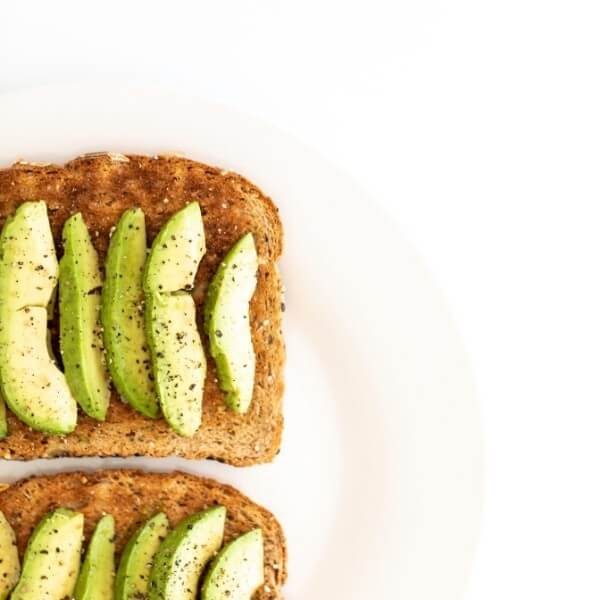
Ingrédients
Two slices of Spelt sourdough bread (toasted or natural)
Sweet option
Top it with peanut butter or almond butter spread and a light drizzle of maple syrup
Savoury option
30g mashed avocado
a sprinkling of linseeds (optional)
1 boiled or scrambled egg
Directions
Serve this recipe with one glass of lactose-free milk to meet children’s high daily requirement of calcium intake.
Teenagers in particular have high calcium requirements.
Tropical breakfast bowl
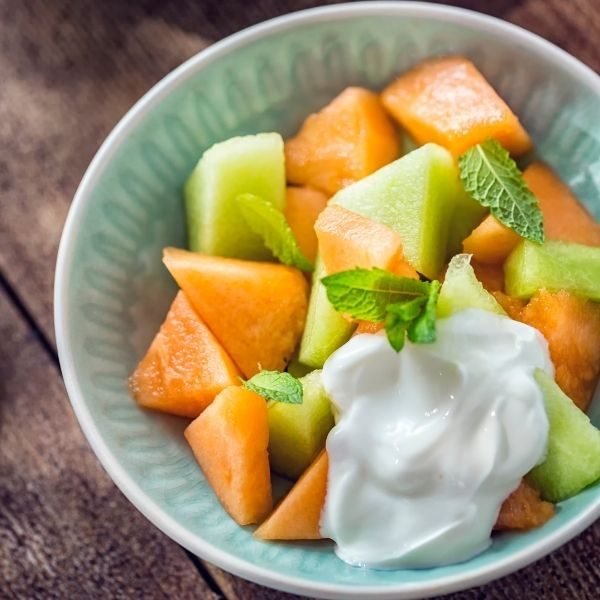
Ingredients
Calcium-fortified coconut yoghurt
1 teaspoon toasted almonds sliced, chopped or whole
1/2 cup of chopped melon
1/5th cup chopped mango
sprinkling or chia or flax seeds
Directions
Top the yoghurt with chia or linseeds to increase fibre (this is especially perfect for children with constipation)
Breakfast Cereals
Children can enjoy a bowl of lactose-free milk or plant drinks with breakfast cereals.
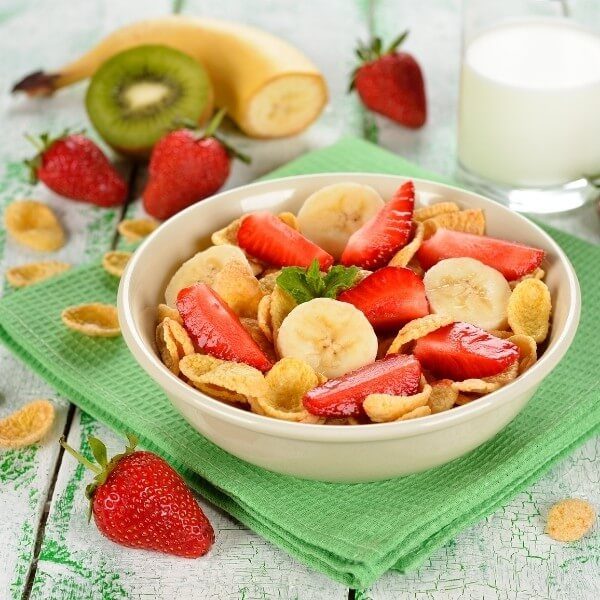
Ingredients
1 bowl of cornflakes
1/2 ripe banana
1 kiwifruit sliced (optional)
10 strawberries
Directions
Always serve breakfast cereals with fruit such as kiwifruit, banana, melon or berries for a delicious serving of vitamins and fibre.
Overnight creamy oats
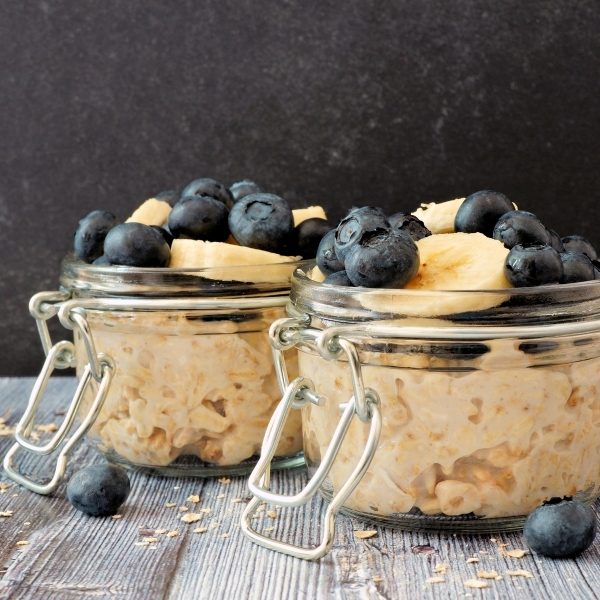
Ingredients (for 1 serving)
40g rolled oats (any type)
10g whole almonds
1/4 teaspoon cinnamon (ground)
120ml lactose-free milk
Directions
Using a food processor, blend the oats and almonds. Transfer into a bowl, add a pinch of cinnamon. Next, add the milk and mix well using a spoon. Cover and place it in the refrigerator overnight.
You can top the overnight oats with 1/4 teaspoon of chia seeds. These are a plant-based source of omega 3 fats.
You can also add berries or alternative low fodmap fruit to increase your child’s fibre intake.
Weekend Low FODMAP Breakfast Recipes for the family
Sunday Oat and Banana Pancakes (makes 6)
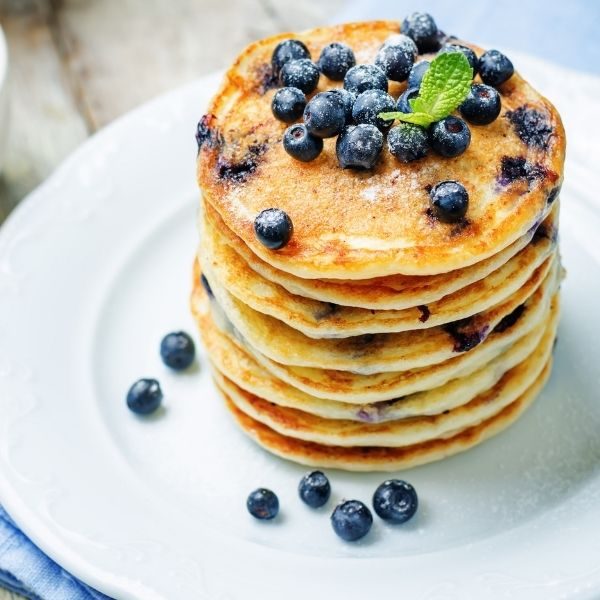
Ingredients
140g rolled oats
100g of rice flour
2 teaspoons baking powder
2 unripe bananas, mashed
2 eggs
200ml lactose-free milk
1 tablespoon vegetable oil
Directions
In a bowl, mix the rolled oats, rice flour and baking powder. Add the mashed bananas, and eggs and whisk until well combined. Gradually add the lactose-free milk until you have a smooth dough.
Heat oil in a frying pan at medium heat. Spoon the dough on the frying pan to have 9 cm-sized pancakes.
Once bubbles appear on the top, you can flip the pancakes and cook them for an additional minute.
Children of all ages can enjoy pancakes with blueberries, strawberries, almond or peanut butter and maple syrup.
Top tip: made too many? Freeze the pancakes for another day
Low FODMAP Chocolate Waffles
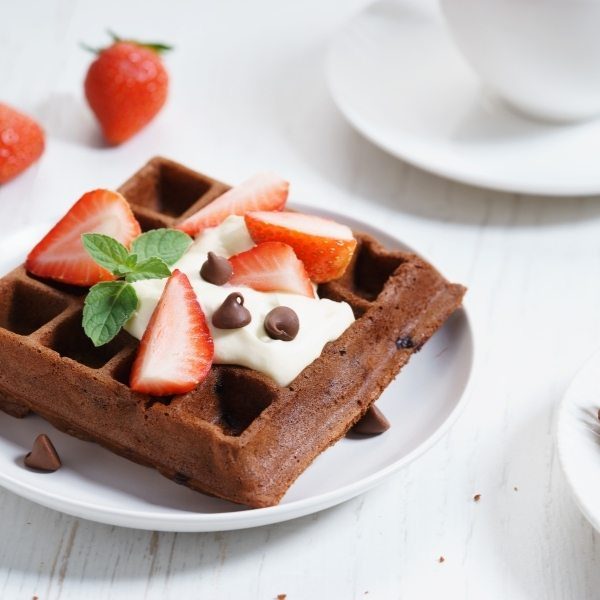
Ingredients
150g of oat flour
100g of gluten-free flour
3 tablespoons of raw cacao powder
3 tablespoons of sugar
2 eggs
280ml lactose-free milk
Directions
In a bowl, mix the oat flour and gluten-free flour. Add the raw cacao powder and sugar.
Now add the eggs and whisk until well combined.
Add the lactose-free milk and blend to have a smooth dough.
Preheat the waffle maker and cook the waffles accordingly.
Chocolate waffles can be topped with fresh fruits such as berries and other low fodmap fruit of your choice.
IBS friendly Peanut Butter Muffins ( for 12 muffins)
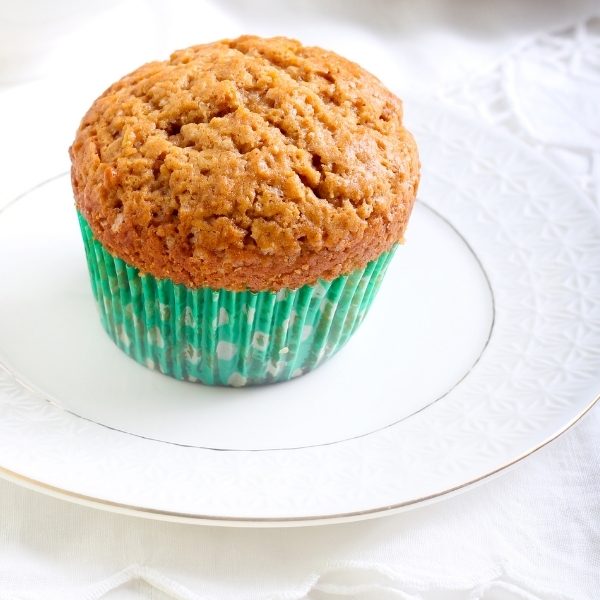
Ingredients
2 eggs
100ml of lactose-free milk
40g brown sugar
60g peanut butter
1 banana
200g oat flour
1 teaspoon baking powder
60g chocolate chips (optional)
Directions
In a blender, pulse and blend all the ingredients until the mixture is creamy.
You can add 60g of chocolate chips to the creamy mixture (optional).
Put the preparation into 12 mini muffin tins and bake for about 15 minutes at 180 degrees.
Top tip: you can decrease the added sugar by replacing 40g of sugar with one additional banana.
Colourful Acai Bowl
inspired by Monash recipes
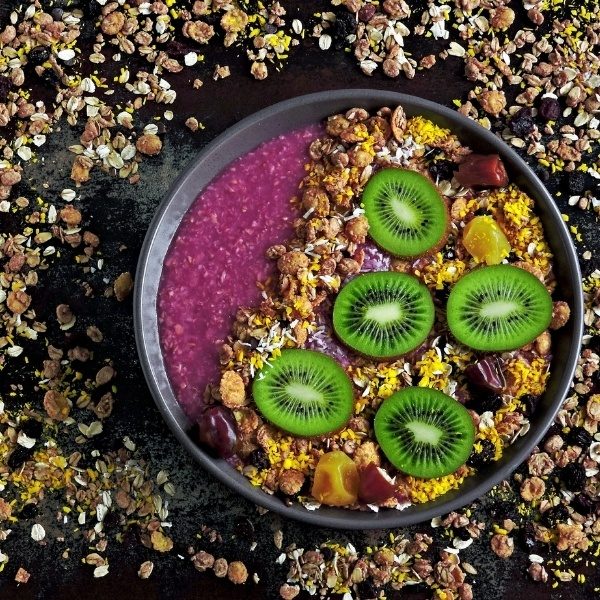
Ingredients
40g acai powder
15g raspberries
145g strawberry
25g of baby spinach
120ml lactose-free milk
2 teaspoons peanut butter
Directions
In a blender mix all the ingredients. Pulse until you get a creamy texture. Pour into a bowl and decorate it with low fodmap fruits such as melon or kiwifruit.
Top tip: Great recipe as it gives your kids at least one portion of fruits along with calcium and protein.
Kiwi Smoothie Bowl
inspired by Monash recipes
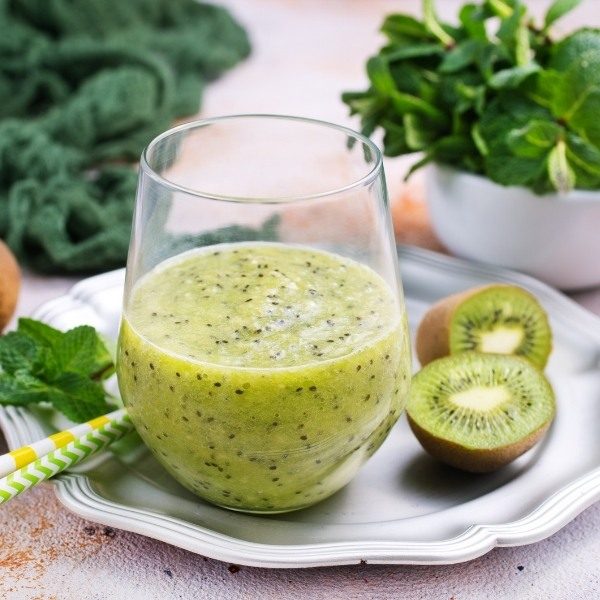
Ingredients
2 green kiwifruit, peeled
1 unripe banana
60g chopped kale
1 teaspoon Kakadu plum powder (or use ground cinnamon)
1/2 cup lactose-free milk
Directions
Blend together all of the above ingredients. You can top your child’s smoothie with low fodmap granola for a crunchy finish.
Top tip: This a tasty recipe for older children who need breakfast on the run. Also perfect for children and teenagers who struggle with constipation.

Bottomline
Low-fodmap breakfast recipes don’t need to be complicated. Remember that eggs can be used on the low fodmap diet and will be automatically an IBS breakfast-friendly option. By using the recommended ingredients that your dietitian provides you with as part of the IBS Kids Programme, creating an IBS breakfast menu can be done in a few minutes!
Need personalised help? Book a free initial call and enquire about my IBS Kids Programme.
Ready to join the IBS Kids Programme?
Great! You can book your initial appointment and learn more here.
Subscribe: Apple Podcast | Email | Spotify | Stitcher
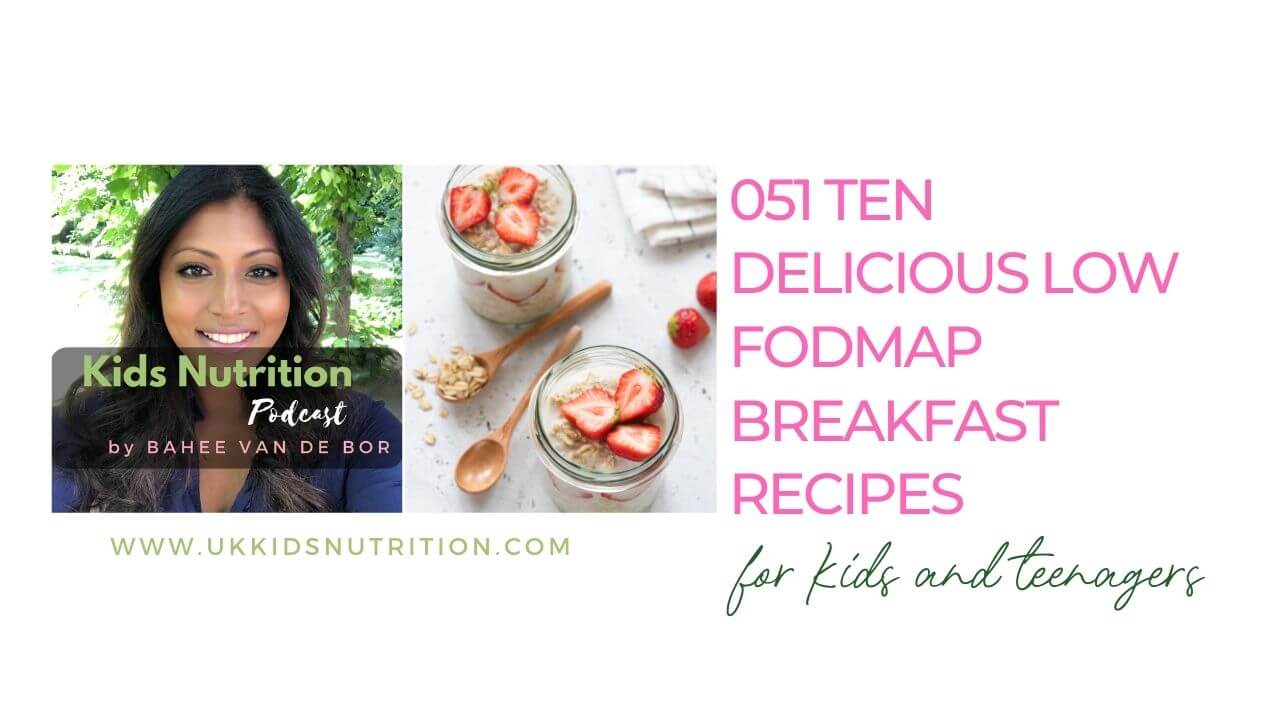
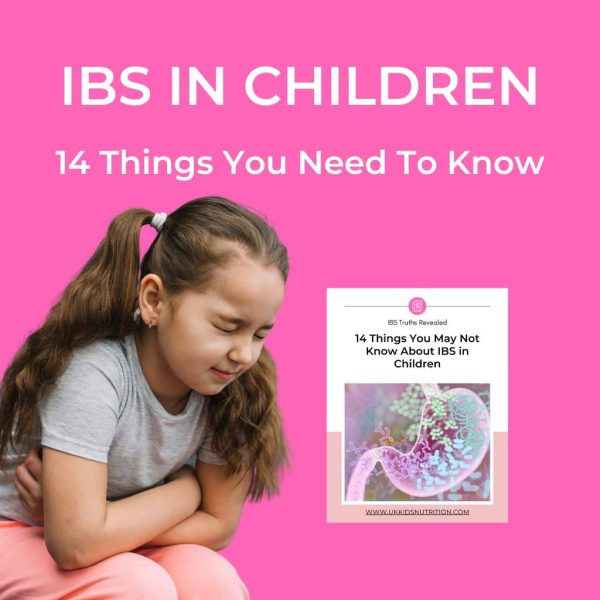
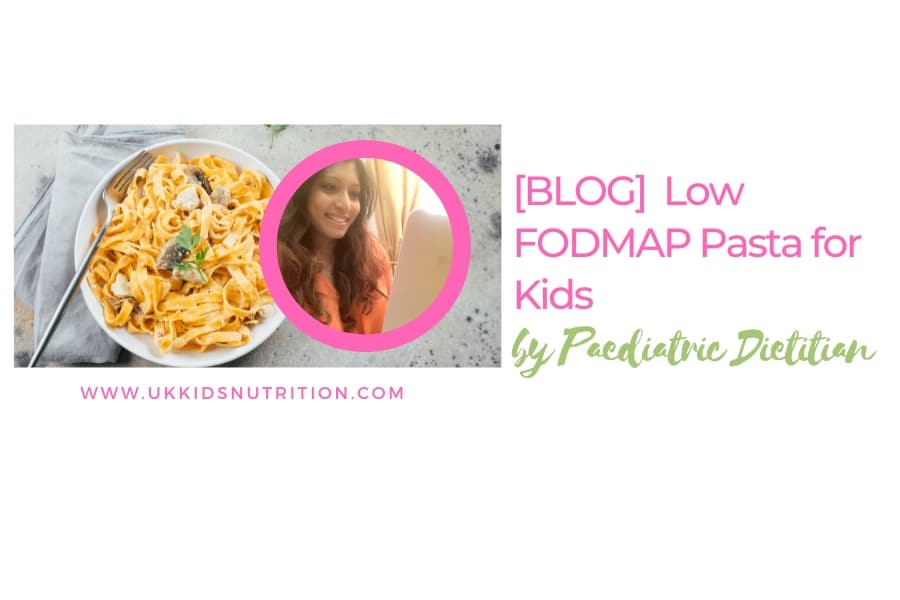
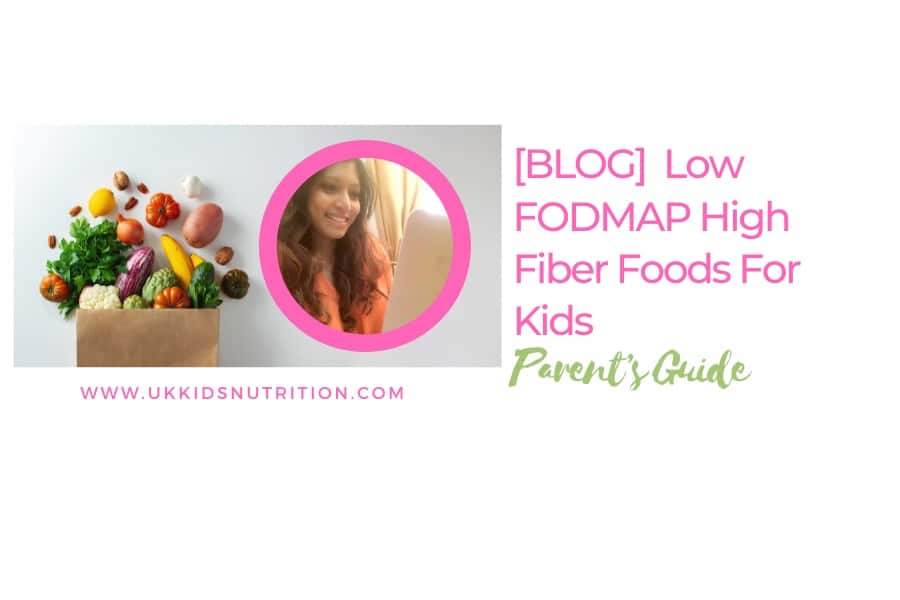
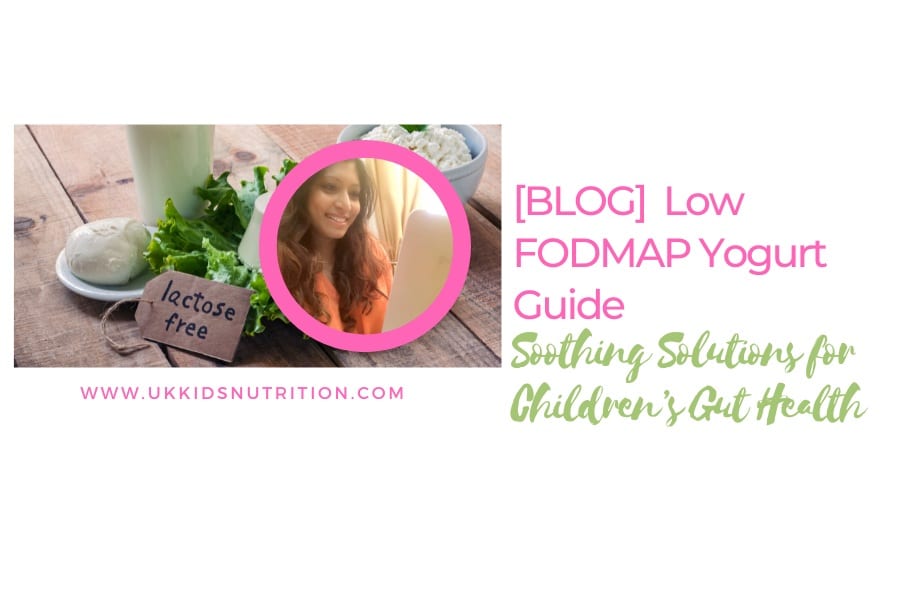
5 thoughts on “Ten Delicious Low FODMAP Breakfast Recipes”
It sounds to be very tasty! Thank you for this post!
I learned a few tricks with this recipe! Thanks for sharing this with us.
It looks really healthy and tasty. I will try at home this weekend. Thanks for sharing with us.
I’ve never had a dish like this before. It looks really good! Beautiful recipe and amazing captures! Nice post.
This looks great with wonderful explanations and pictures